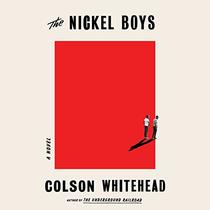Helpful Score: 1
This book was a boring convoluted mess. Too many characters and stories that went with no endings. The author couldn't seem to make up his mind between using the word nigger, colored, black, or negro. Elwood's story that turns into Turners with martin luther king jr jargon thrown in for the colored man's plight. A work of fiction based on Dozier School for Boys. Whitehead should've just did research on the school and wrote a non fiction book about it. I don't understand all of the rave reviews.
Helpful Score: 1
I read Whitehead's Pulitzer Prize winning novel The Underground Railroad a couple of years ago which I thought was well worth reading as an alternative history using real events to show the plight of the African American during the pre-civil war period. THE NICKEL BOYS is a work of fiction that was inspired by true events that happened at the Dozier School for Boys in Marianna, Florida. I saw a TV story on CBS' Sunday Morning Show about Whitehead's writing of the book and the atrocities that occurred at the Dozier School. Based on this, I decided I definitely wanted to read this one.
Whitehead uses the background of the school for the novel. He changes the name of the school to the Nickel Academy and paints a very bleak picture of a place where the sadistic staff beats and sexually abuses the students, corrupt officials and locals steal food and supplies, and any boy who resists is likely to disappear "out back". Out back is where problem students are beaten to death with a whip and then buried in unmarked graves. The protagonist of the novel is young African-American Elwood Curtis who is sentenced to the school because he had hitched a ride with a man in a stolen car. Even though he was only riding in the car and did not know it was stolen, he is still sentenced to a term at Nickel. Elwood soon faces the realities of the place when he tries to break up some bullying and ends up in the "White House" where he is beaten with a leather strap. He later makes friends with another youth named Turner, and they dream about the day when they will be free. Elwood wants to report the abuses going on at the school as he knows his hero, Martin Luther King, would do. But is that a wise thing to contemplate?
I really thought this was a well done novel. It includes a good plot line with some twists I didn't see coming. It is also a coming of age story where the protagonist must endure growing up in the segregated South of the 60s and be subjected to the atrocities of being incarcerated in a school that is little more than a horrific prison for young boys.
Whitehead uses the background of the school for the novel. He changes the name of the school to the Nickel Academy and paints a very bleak picture of a place where the sadistic staff beats and sexually abuses the students, corrupt officials and locals steal food and supplies, and any boy who resists is likely to disappear "out back". Out back is where problem students are beaten to death with a whip and then buried in unmarked graves. The protagonist of the novel is young African-American Elwood Curtis who is sentenced to the school because he had hitched a ride with a man in a stolen car. Even though he was only riding in the car and did not know it was stolen, he is still sentenced to a term at Nickel. Elwood soon faces the realities of the place when he tries to break up some bullying and ends up in the "White House" where he is beaten with a leather strap. He later makes friends with another youth named Turner, and they dream about the day when they will be free. Elwood wants to report the abuses going on at the school as he knows his hero, Martin Luther King, would do. But is that a wise thing to contemplate?
I really thought this was a well done novel. It includes a good plot line with some twists I didn't see coming. It is also a coming of age story where the protagonist must endure growing up in the segregated South of the 60s and be subjected to the atrocities of being incarcerated in a school that is little more than a horrific prison for young boys.




